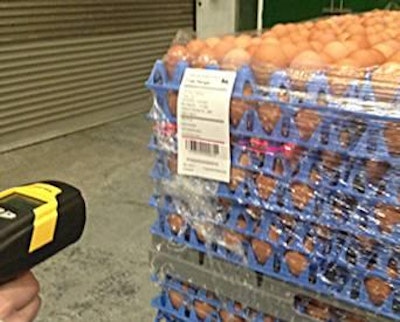
It was not so very long ago that horsemeat masquerading as beef grabbed headlines around the world. Consumers lost confidence, supermarkets lost money, and meat processors lost business. Various traceability systems have come under scrutiny as a consequence.
Poultry International spoke recently to Job Beekhuis, CEO of Ovotrack, about traceability in the egg industry.
Poultry International: Why has traceability grown in importance over the last couple of decades, when previously it was rarely thought about?
Beekhuis: Traceability really is important. Everyone knows that consumers now are demanding ever more, and with the strength of the media these days, information is more freely available. If something goes wrong, the news travels around the world very quickly.
PI: So the main driver is the media?
Beekhuis: News now can go around the world in a matter of minutes. If something goes wrong in your food production processes, everyone knows before even you do! But it is not that simple.
In the case of eggs, what you see in the majority of supermarkets is that eggs tend not to be branded by the producer, they are a supermarket product - and the retailer's name is on the line should something go wrong. For the general public, when something goes wrong, it is the fault of retailers, and they pay the bill!
PI: Supermarkets certainly hold ever-more power, but what other factors are contributing to the increasing importance of traceability?
Beekhuis: In some parts of the world, there is a change from large caged flocks to smaller flocks from various housing systems, such as cage free and free range. Where a truckload of ungraded eggs used to be simply one batch from one farm, it could now easily comprise 20 or more batches. Obviously, this makes things far more complicated.
If you don't have an adequate traceability system, should problems emerge with one batch. then the whole lot - 20-30 batches - will have to be recalled. The source of the problem, however, may well have been with just one flock.
This may sound like a particularly European issue, but it really is not. You only have to think of how specialty eggs are gaining share across various markets today. Eggs from smaller flocks are being delivered to the grader from a variety of sources, and this is a trend that will grow around the globe.
Awareness of tracking and traceability is increasing in the developing world as well, and one reason behind this is the globalization of retail. Multinationals and global business operations can exert pressure, and they do. Traceability can help the flow of trade. Global trade negotiations can open up a market to what may be termed "inferior goods," but traceability at least allows you to know what you are getting.
PI: So good traceability systems offer retailers guarantees, protect the producer and keep consumers calm.
Beekhuis: Traceability offers a lot more to the consumer. When eggs are being sourced from different flocks raised in different ways, some will be more expensive than others because they have different qualities. In addition to buying a safe and healthy product, consumers want to be sure that they are actually getting what they are paying for.
It's worth thinking about what happened in the UK a few years ago, where a packer was buying in battery eggs and selling them as organic or free range. Some 100 million eggs may have been fraudulently sold.
Fraud can harm the whole industry but lead to huge benefits for the perpetrator, so there will always be temptation. Sooner or later, however, you get caught. If one incident is published in the media, sales go down for everyone.
Following this, the British Lion Quality Code was adapted so that egg stamping with farm of origin was carried out at the farm of origin rather than at the grading center.
PI: So are there any other benefits?
Beekhuis: Yes, there are. As recently as only a few years ago, a lot of people saw traceability as a burden and something that they were forced into doing. However, this attitude is changing. What is increasingly understood is that full traceability, by its nature, gives you a lot of data and a lot more management information.
Once you have a system in place at the grading center, you can know not only where eggs have come from, but also where they will go. You can know how many eggs are waiting and how many have been graded or shipped out, and this gives you better stock control, not only for eggs but also for packing materials.
There are two main sides to tracking and traceability: back and forward traceability.
With the coding of eggs, tracing back is covered. You, the consumer, can track check the source. But tracking forward is important as well, especially should a recall have to take place.
Without tracking forward, should a problem arise, all you can do is call the retailer and say "Get them all back!" And that brings me back to my original point - such a situation is front page news. You only need to be part of a big recall once, and everything changes forever.
PI: Why has it taken until now for tracking and traceability to really take off?
Beekhuis: The technology to trace eggs has really improved over the last 10 years. Once, it was only possible to print on them at the grading plant. Now, however, the quality and affordability of stampers and printers have improved significantly, so this can be carried out on the farm.
Similarly, the computers and software needed to operate a good traceability program have become much cheaper. A good system will allow such things as the printing of specific retailer codes, with the information that the retailer needs. This was not possible in the past.
So traceability is not only fulfilling a legal requirement, but it also brings an increase in benefits.
PI: By way of comparison, what would be the result if something similar to the horsemeat scandal happened in the egg industry?
Beekhuis: That's hard to answer, but what I do know is that the Dutch government, for example, ordered the implicated meat processor to recall everything that had been delivered over the previous six weeks.
If something similar were to happen to an average egg grading center, grading 5 million eggs per week, the recall would be 30 million eggs. In the case of eggs, most would already have been consumed, but if only two weeks' of deliveries were recalled without compensation, this would mean bankruptcy for the vast majority of egg graders.

















